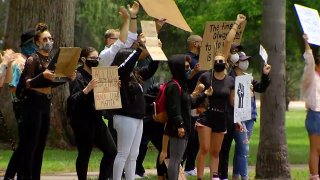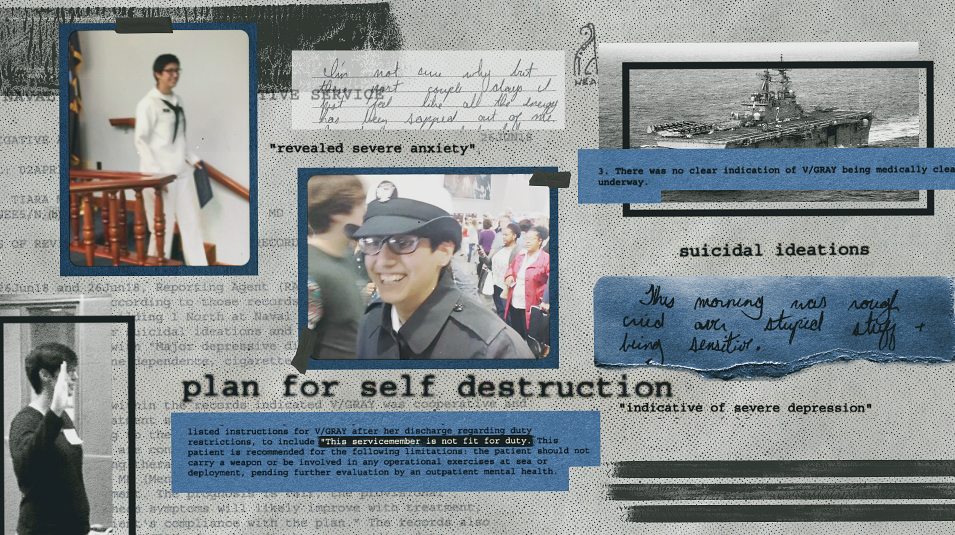
Multiple law enforcement agencies in San Diego County announced bans on the carotid restraint Wednesday following years of community plea capped by a week of outcry heard and felt in protests that have expanded beyond the borders of the United States since the in-custody death of George Floyd in Minneapolis.
In addition to demanding prosecution of the officers involved in Floyd's arrest and death, the protests called for police reform and civil and social equality for non-white people in America.
Officers using a carotid restraint wrap their arms around a suspect's head, forming a "V" with the officer's forearm and bicep squeezing on the carotid arteries. The neck restraint is meant to be more humane than a chokehold, which restricts the airways instead of the carotid arteries on the sides of the neck, but it has been criticized for being used more frequently on members of minority communities.
San Diego Chief of Police David Nisleit banned the restraint tactic on Monday, and Mayor Kevin Faulconer threw his full support behind a November ballot measure that would create a an independent police review group with subpoena power and investigative abilities, which could lead to more changes within the department.
Sheriff Gore's announcement came one day after issuing a statement in which he supported the use of the controversial non-lethal neck hold, calling it safe and effective. The statement also said he had no plans to do away with the restraint, which he said was used 66 times last year during a total of 4,044 use-of-force incidents.
"I understand the community's distrust of law enforcement after the death of George Floyd," Gore said in Tuesday's statement. "What we saw in Minneapolis was a completely unjustified use of force... To take away a safe law enforcement technique from our deputies, especially when they are under assault, is wrong."
Local
Gore reversed his stance Wednesday, saying "In light of community concerns, and after consultation with many elected officials throughout the county, I am stopping the use of the carotid restraint by my deputies effective immediately. I have and always will listen to any feedback about the public safety services we provide. Working together, we can ensure San Diego remains the safest urban county in the nation."
A statement from the Carlsbad Police Department Chief Neil Gallucci. read in part, "We join law enforcement from throughout our region in acknowledging the community’s concerns over the use of this technique, following the shocking video from Minneapolis and the tragic death of George Floyd."
Gallucci also said "using body weight with a knee on a suspect’s neck is inconsistent with any training provided to members of the Carlsbad Police Department. "
Since 2017, the department has used the carotid control hold eight times.
Chula Vista Chief of Police Roxanne Kennedy said the decision to ban the restraint came after careful consideration.
Coronado Police Chief Chuck Kaye made his announcement via Twitter.
"The use of the carotid neck restraint can cause undo harm," Kaye tweeted. "The #cityofcoronadopolice will eliminate its use effective today. We will continue to focus on de-escalation as we serve our community."
Mayor Arapostathis announced the ban on behalf of the La Mesa Police Department at a news conference on Wednesday addressing a separate controversial arrest of a black man last week, near a trolley stop in the East County City, and a protest on Saturday stemming from that arrest and Floyd's death.
A statement from the National City Police Department said the ban was implemented in an effort to maintain the community's trust and confidence.
"The community in general has expressed concerns regarding the use of the carotid restraint by police. The National City Police Department has listened to those concerns and effective immediately, our officers will no longer use the carotid control hold as a less lethal option. In order to maintain the trust and confidence of our community, we will remain open to discussion and continue to challenge ourselves to improve in all areas of our work and profession." the statement read.
Oceanside Chief of Police Frank McCoy said the carotid restraint tactic is considered unacceptable in many communities and would now be banned in Oceanside as well.
"It is time for our department to focus on alternative de-escalation tools and techniques that will help ensure the safety of those individuals in our custody," McCoy said in a statement released on Wednesday. "The Oceanside Police Department is committed to continuing to provide our officers with extensive training on de-escalation tactics and promoting new tools as appropriate alternatives."
Bans were also implemented by police departments in El Cajon and Escondido, and by the San Diego Community College Police Department, San Diego Harbor Police Department, San Diego State University Police Department, San Diego Unified School District Police Department, and the University of San Diego Police Department.
On Friday, Gov. Gavin Newsom ordered that law enforcement officers in the state no longer be trained in the use of carotid restraint holds that are employed to render suspects unconscious, but can be potentially deadly.
Newsom said he was directing California's Peace Officer Standards and Training, or POST, to immediately halt training on such holds.
Floyd, a black man, was arrested May 25 on suspicion of trying to use a counterfeit $20 bill. Video footage of Floyd's arrest shows a white Minneapolis Police Department officer pressing his knee into Floyd's neck for more than eight minutes while Floyd laid on his stomach in the street.
The officer, Derek Chauvin, was arrested four days later on charges of third-degree murder and manslaughter. The charges were elevated Wednesday to second-degree murder, and the other three officers were charged the same day with aiding and abetting second-degree murder.
A carotid restraint was not used on Floyd. In fact, the Minneapolis Police Department confirmed the tactic used by Chauvin was not protocol for their officers.
Chief Nisleit said that in the past he has expressed concern over eliminating the carotid restraint but acknowledged it was time to listen to his community.
"One of my goals as chief of police is to stop fatal encounters between our police officers and the community, and right now we know the carotid restraint is something that makes people very angry," he said. "Looking at the big picture, it’s something I’m trying to do to calm everybody down to make sure we’re not having those types of encounters between law enforcement and the community."
San Diego City Councilwoman Monica Montgomery praised the police force for its progress towards reform.
"As elected officials, we have a collective responsibility to stand up to the injustices that have plagued our communities of color," she said. "We do this by demanding accountability, transparency, and working together to confront systemic racism.”
San Diego County Supervisor Nathan Fletcher used SDPD's policy change to call on the sheriff's department to do the same. After Gore's announcement, Fletcher called it an actionable step toward change.
"I commend Sheriff Bill Gore for agreeing to eliminate the carotid neck restraint and empowering deputies to use less harmful de-escalation tactics," Fletcher said. "Our voices have been heard. This is one actionable step toward healing the broken relationship between law enforcement and the black community. Thank you to the nearly 2,000 residents who signed our petition. Our work is not done: I commit to continue to address the systemic oppression and racism that disproportionately impacts our communities of color."



